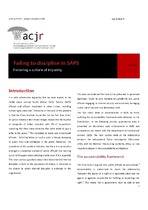| dc.contributor.author | Africa Criminal Justice Reform | |
| dc.date.accessioned | 2019-12-05T13:29:45Z | |
| dc.date.available | 2019-12-05T13:29:45Z | |
| dc.date.issued | 2019 | |
| dc.identifier.citation | Africa Criminal Justice Reform.(2019). 'Failing to discipline in SAPS - Fostering a culture of impunity'. Dullah Omar Institute: University of the Western Cape | en_US |
| dc.identifier.uri | http://hdl.handle.net/10566/5105 | |
| dc.description.abstract | It is with unfortunate regularity that we read reports in the media about corrupt South African Police Service (SAPS) officials and officials implicated in other crimes, including human rights violations. Indicative of the scale of the problem is that the Ethics Institute found that for the first time bribes for police matters and criminal charges moved into the top five of categories of bribes reported, with 7% of respondents reporting that they knew someone that were asked to pay a bribe to the police. This translates to nearly one in ten South
Africans. Soliciting bribes on such a scale is deeply damaging to public trust and confidence in the police. Moreover, the prevalence of the problem indicates that there is a perception amongst a substantial number of police officials that nothing can or will happen when soliciting a bribe even if it is reported. This raises serious questions about the enforcement of internal discipline in SAPS as the prevalence of bribery is indicative of the extent to which internal discipline is enforced in the organisation. | en_US |
| dc.language.iso | en | en_US |
| dc.publisher | Dullah Omar Institute | en_US |
| dc.subject | South African Police Service | en_US |
| dc.subject | Accountability framework | en_US |
| dc.subject | South Africa | en_US |
| dc.subject | Transparency | en_US |
| dc.title | Failing to discipline in SAPS - Fostering a culture of impunity | en_US |
| dc.type | Article | en_US |

